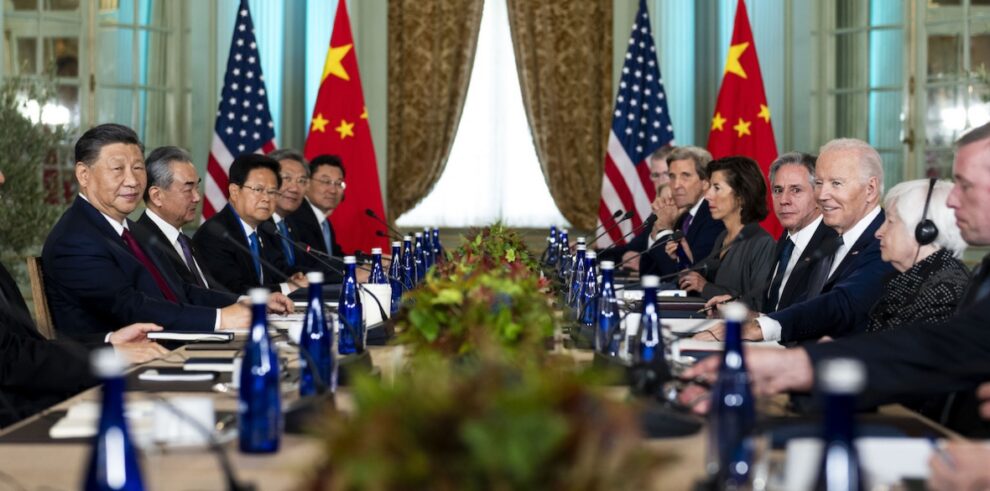Despite the usual Western media refrain that ‘China is in decline,’ its position is getting stronger, alongside the rest of the global South — a good time to broker deals with the US then, writes KEITH BENNETT
THE recent Apec summit in San Francisco was largely overshadowed by the meeting between US President Joe Biden and his Chinese counterpart Xi Jinping that immediately preceded it.
The two men met for four hours on November 16, in a mansion once better known for the US soap opera Dallas having been filmed there. For what was almost certainly the most important diplomatic encounter of 2023 its actual results appear rather modest.
They featured an agreement on Artificial Intelligence, counternarcotics co-operation, the resumption of military-to-military communications, the expansion of direct flights, and the promotion of a range of bilateral exchanges, including a high-level dialogue on tourism and streamlining visa application procedures.
An agreement to co-operate on climate change was announced just before the summit. US Special Presidential Envoy for Climate Change John Kerry has been one of just a handful of US politicians to have retained a rational approach to China.
But what was actually significant about the meeting was that it took place at all — and in so doing, as a number of commentators have noted, established a floor under bilateral relations.
That this should rightly be regarded as a not inconsiderable achievement is in itself testimony to just how far the world’s most important diplomatic relationship has deteriorated in the last decade under the successive presidencies of Obama, Trump and Biden.
From the Chinese point of view, Xi’s visit was above all a voyage for peace. As the Chinese leader told a subsequent business dinner: “I often say that what the Chinese people oppose is war, what they want is stability, and what they hope for is enduring world peace.”
The last decade’s deterioration in relations with Washington, which began with the “pivot to Asia” proclaimed by Barack Obama and his Secretary of State Hillary Clinton, was not what China wished to see.
As a socialist country still engaged in a quest for modernisation and development, China is committed to peace and has no interest in war.
It is the US that has waged wars in Korea and Vietnam, wars which were in no small measure directed against China; that has increased its supply of weapons to the renegade Chinese province of Taiwan, in flat contradiction to repeated pledges it has made since 1972; that has surrounded China with military bases; and that has rigged up a string of alliances aimed at containing China, be it the Quad with India, Japan and Australia, Aukus with Australia and Britain, or this summer’s Camp David deal with Japan and South Korea.
This, of course, is not the message you’re likely to hear from our mainstream media. A predictable, and predictably woeful, example was provided by the BBC website on November 15, the day before the summit.
Under the headline, “Xi Jinping arrives in the US as his Chinese dream sputters,” the article claims that the Chinese president was in “a more vulnerable negotiating position this time,” as compared to his last US visit five years ago. As evidence for this, it asserted that “after an initial bounce back, the post-Covid Chinese economy has turned sluggish.”
China certainly does not deny that its economy is facing certain headwinds. Probably the greatest single cause for this, although there are certainly others, is the increasingly aggressive US sanctions aimed at stifling China’s innovation and technological development.
Naturally, the BBC report makes no mention of this. Instead, it informs us that: “Some observers have contrasted China with the US, whose economy has weathered the post-Covid recovery better.”
One might understand why such observers apparently wish to retain their anonymity, given that official IMF figures estimate that the US growth rate for 2023 will be 2.1 per cent while that for China will be well over twice that at 5.4 per cent.
What is completely absent from the BBC analysis, and that of the whole mainstream media, regarding the relative weight of China and the US at the present time, is any consideration of the profound shift taking place in the international balance of forces.
The late Tony Benn used to quip that, having met Tony Blair but not George W Bush, he had met half the international community. And viewed through this prism the attempts to isolate and stigmatise China might be said to have enjoyed a measure of success.
But an assessment based on real-world criteria tells a different story. At their Johannesburg summit in August, the Brics group of major developing countries, in a process largely initiated and driven by China, more than doubled its membership with the admission of a further six countries.
More than 40 countries have expressed an interest in joining, with Pakistan the latest to officially apply. Even before its first planned round of expansion, the Brics’ GDP had surpassed that of the G7.
Less than two months later, Xi welcomed representatives from more than 150 countries, including some 23 heads of state and government and the secretary-general of the UN, to a conference marking 10 years since he first put forward his flagship Belt and Road Initiative.
In stark contrast to the “winner takes all” approach aggressively touted by Donald Trump, but actually promoted with greater assiduity by Biden, Xi told the assembled delegates at the opening ceremony: “We have learned that humankind is a community with a shared future. China can only do well when the world is doing well. When China does well, the world will get even better.”
It is little wonder that this is a more appealing message to the majority of countries in the world, that wish to develop their economies while maintaining their independence.
Even on the sidelines of the Apex summit, at the first meeting between the Chinese leader and his Mexican counterpart, President Amlo, in words that should have struck home to his US hosts, noted that, at the height of the Covid-19 pandemic, China was the first country to offer assistance, providing a large amount of medical supplies to Mexico.
In contrast to the steady progress of Chinese diplomacy, on November 2 187 countries voted in the UN to once again condemn the US embargo on Cuba. Only Israel joined the US in voting against, with Ukraine’s the sole abstention.
A little earlier, on October 27, after repeated US vetoes in the security council, the UN general assembly voted in favour of a ceasefire in Gaza, securing the pre-set two-thirds majority necessary for adoption; 121 countries voted in favour, with just 14 voting against and 44 abstentions. And, to US consternation, the entire global South has rebuffed its demand that they impose sanctions on Russia.
Looking at things from this objective but generally hidden assessment of global trends will shed more light than that offered by the BBC as to who sat down in California with “a more vulnerable negotiating position.”
Source : Morning Star






































